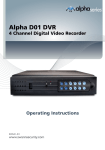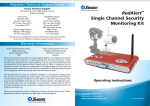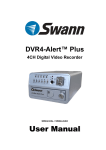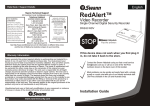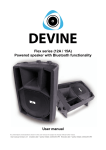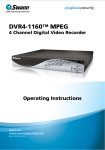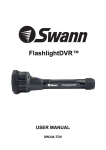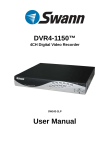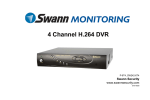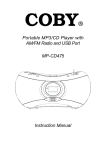Download Swann DVR4-1000 DVR User Manual
Transcript
™ plug&playsecurity Advanced security made easy ™ DVR4-1000™ 4 Channel Digital Video Recorder Swann Technical Support All Countries E-mail: [email protected] Telephone Helpdesk USA toll free 1-800-627-2799 (Su, 2pm-10pm US PT) (M-Th, 6am-10pm US PT) (F 6am-2pm US PT) USA Exchange & Repairs 562-777-2551 (M-F, 9am-5pm US PT) AUSTRALIA toll free 1300 138 324 (M 9am-5pm AUS ET) (Tu-F 1am-5pm AUS ET) (Sa 1am-9am AUS ET) NEW ZEALAND toll free 0800 479 266 INTERNATIONAL +61 3 8412 4610 See http://www.worldtimeserver.com for information on time zones and the current time in Melbourne, Australia compared to your local time. Operating Instructions © Swann Communications 2008 SW242-DU2 / SW244-DUX / SW244-DUM www.swannsecurity.com 24 SR242-DU2-10005-040309 1 Before You Begin FCC Verification: NOTE: This equipment has been tested and found to comply with the limits for Class B digital device, pursuant to part 15 of the FCC Rules. These limits are designed to provide reasonable protection against harmful interference in a residential installation. This equipment generates, uses and can radiate radio frequency energy and, if not installed and used in accordance with the instructions, may cause harmful interference to radio or television reception, which can be determined by turning the equipment off and on, the user is encouraged to try to correct the interference by one or more of the following measures: · Reorient or relocate the receiving antenna · Increase the separation between the equipment and the receiver · Connect the equipment into an outlet on a circuit different from that to which the receiver is connected · Consult the dealer or an experienced radio/TV technician for help These devices comply with part 15 of the FCC Rules. Operation is subject to the following two conditions: (1) These devices may not cause harmful interference, and (2) These devices must accept any interference received, including interference that may cause undesired operation. IMPORTANT NOTE: Prohibition against eavesdropping Except for the operations of law enforcement officers conducted under lawful authority, no person shall use, either directly or indirectly, a device operated pursuant to the provisions of this Part for the purpose of overhearing or recording the private conversations of others unless such use is authorized by all of the parties engaging in the conversation. Warranty Information Swann Communications USA Inc. 12636 Clark Street Santa Fe Springs CA 90670 USA Swann Communications PTY. LTD. Building 4, 650 Church Street, Richmond, Victoria 3121 Australia Limited Warranty Terms & Conditions Swann Communications warrants this product against defects in workmanship and material for a period of one (1) year from it’s original purchase date. You must present your receipt as proof of date of purchase for warranty validation. Any unit which proves defective during the stated period will be repaired without charge for parts or labour or replaced at the sole discretion of Swann. The end user is responsible for all freight charges incurred to send the product to Swann’s repair centres. The end user is responsible for all shipping costs incurred when shipping from and to any country other than the country of origin. The warranty does not cover any incidental, accidental or consequential damages arising from the use of or the inability to use this product. Any costs associated with the fitting or removal of this product by a tradesman or other person or any other costs associated with its use are the responsibility of the end user. This warranty applies to the original purchaser of the product only and is not transferable to any third party. Unauthorized end user or third party modifications to any component or evidence of misuse or abuse of the device will render all warranties void. WARNING: Modifications not approved by the party responsible for compliance could void user’s authority to operate the equipment. By law some countries do not allow limitations on certain exclusions in this warranty. Where applicable by local laws, regulations and legal rights will take precedence. IMPORTANT SAFETY INSTRUCTIONS: · Make sure product is fixed correctly and stable if fastened in place · Do not operate if wires and terminals are exposed · Do not cover vents on the side or back of the DVR and allow adequate space for ventilation 2 23 Technical Specifications Contents Video/Audio Video Format: Operating System: Video Input: Audio Input: Video Output: Audio Output: Before You Begin Display and Recording Display Frame: Global Recording Frame Rate: Video Operation Duplex : Display Resolution: Recording Resolution: Compression Format: Size per frame: General HDD Interface: Backup Method: Search Mode: Full Screen: Motion Detect: Loss Detect: Auto Switching: Buzzer Output: Brightness Adjust: Contrast Adjust: Recovery Mode: DC Input: Dimensions: Weight: 22 NTSC / PAL depending on region Embedded RTOS BNC x 4 RCA x 1, Line-In BNC x 1 RCA x 1, Line-Out NTSC: 120 fps (4 × 30 fps) PAL: 100 fps (4 × 25 fps) NTSC: Max. 60 fps PAL: Max. 50 fps Record, Playback NTSC: 640 x 448 PAL: 640 x 544 NTSC: 640x224 PAL: 640x272 Modified MJPEG Normal: 12K Bytes High: 15K Bytes Highest: 20K Bytes SATA HDD x 1 USB Flash Drive, Thumbdrive (up to 2GB max) Time/Date, Event Yes Yes Yes Yes Yes Yes Yes Auto Restore Record on power failure DC 12V 8.6” x 11.3” x 2” 220mm x 288mm x 50mm 3.3lbs 1.5kg Contents Package Contents DVR Layout Front Panel Rear Panel Remote Control Layout 2 3 4 5 5 5 6 Connections & Installation Connecting Cameras and Power Adapter Connecting the DVR to a TV Monitor Turning the DVR On/Off and Auto Recovery Image Display Single Camera View Multi Camera View Installing or Changing a Hard Drive Starting the DVR With a New Hard Drive 7 8 8 9 9 9 10 11 Menu Operation 12 12 12 13 14 15 15 16 17 17 Accessing and Navigating the Menu System Camera Menu Record Menu Motion Detection Menu Screen Menu Audio Menu System Menu Time Search Exit Menu Backing Up Footage to PC Backup Footage Viewing Backup Footage on a PC Using the VVFPlayer software VVFPlayer Interface Extract footage from a larger video clip Exporting an AVI file 18 19 19 19 20 20 Troubleshooting Guide Technical Specifications Warranty Information Technical Support Details 21 22 23 24 3 Package Contents DVR4-1000™ Unit Remote Control Operating Instructions Easy Setup Guide Power Adapter with Cable Software CD BNC to RCA Video Cable Operating Instructions Security Stickers If you are missing any of the components above, contact Swann Communications for assistance. Troubleshooting Guide Problem: The Power light keeps blinking red. Solution: Ensure you are using the correct Power Adapter provided for the DVR. If you have purchased the DVR as part of a kit, make sure the cameras are operating on a separate Power Adapter. The larger power adapter with higher amps is designed specifically for the DVR. Problem: The hard drive is not working. Solution: Ensure the DVR is using the correct Power Adapter supplied. Open the DVR and ensure the SATA cable is connected to the DVR and Hard Drive. Problem: The hard drive usage is at 100% and will not record. Solution: Format the hard drive or set the hard drive to overwrite mode. Problem: I can only see a blue screen where my camera should be. Solution: If only 1 camera view is blue, the DVR is not receiving that camera’s signal. Check that the camera connections on the back of the DVR are secure. Ensure the camera is plugged in and has power. Problem: The DVR will not turn on. Solution: Make sure you are using the correct Power Adapter for the DVR. Try a second power outlet. Check the connections on the back of the DVR. Problem: My DVR does not save footage more than a few days old. Solution: Change the quality settings to Normal, lower the camera frame rates or enable motion recording to conserve hard drive space. Problem: I want to format my Hard Drive but I don’t remember the password. Solution: The default password is “111111”. Swann recommends changing the default password to prevent tampering or unauthorized use. Problem: I am using wireless cameras and the DVR keeps beeping and motion records all the time. Solution: Analog wireless cameras suffer from interference. The DVR interprets the change of image as motion and records. Swann recommends the use of wired cameras or digital wireless cameras such as the ADW-300 for DVR recording. 4 21 Viewing Backup Footage on a PC (cont) DVR Layout Extract footage from a larger video clip Front Panel When dealing with larger backup files it may be necessary to extract smaller clips. The following describes how to extract footage and export to a new .VVF file. 2 1 3 4 5 11 12 13 6 7 8 9 1. Open and play the clip to extract from. 2. Pause the clip where you want to start the extraction. 3. Right-click the camera view and select Capture > Mark In 4. Find and Pause the clip at the end of the extraction. 10 5. Right-click the camera view and select Capture > Mark Out 6. Right-click the camera view and select Capture > Export and save the file name and location. Note this export is in .VVF format. 1. USB Connection Download backup footage to Flash Drive (not included) 5. Left Arrow Move cursor left in menus or camera 4 fullscreen view 10. Play/Pause Button Push to begin last recording or pause playback Exporting an AVI file 2. Up Arrow Move cursor up in menus or Camera 1 fullscreen view 6. Menu Button Press to enter main menu / previous menu / exit menu 11. Rewind Button Push to rewind playback / confirms selection in menus 3. Down Arrow Move cursor down in menus or Camera 2 fullscreen view 7. Remote Control Sensor 12. Fast Forward/Auto Switching Button Push to fast forward playback / confirms selection in menus To view video footage on another computer create an AVI file using the built in export ability. 1. Right-click the main Camera view and click Export > AVI 4. Right Arrow Move cursor right in menus or camera 3 fullscreen mode 8. Power Indicator Lights on when DVR powered 9. Hard Drive Indicator Lights when hard drive is active (recording, searching etc.) Rear Panel 13. Record/Stop Button Push to begin or stop recording 3 2. Click “Browse...” next to Input File and select the video you want to convert. 3. Click “Browse...” next to Output File to select a location to export. 4. Choose your preferred compression method by clicking Select... If you are unsure which method to use, select the default uncompressed mode. 5. Click OK to export the file. 6. Playback the file in your preferred media player. 1 2 4 5 1. Video Output Output to TV monitor 4. Audio Output Output to speaker 1 x RCA 2. Video Input Inputs for cameras x 4 BNC 5. DC 12V Power Input Power Adapter connection for DC 12V adapter only 3. Audio Input Input for microphone 1 x RCA 20 5 Viewing Backup Footage on a PC Remote Control Layout 1-4. Camera Select Buttons Changes to corresponding camera when pressed 5. Record / Stop Button Start or stop recording 6–7. Up & Down Buttons Moves up / down in menus 8-9. Rewind & Fast Forward Moves left / right in menus Using the VVFPlayer software View backed up footage from the DVR4-1000™ with the included VVFPlayer software located on the CD. 1. Copy the VVFPlayer software from the CD to your computer. 2. Double click to open the VVFPlayer software. 3. Click the File Folder (4) to bring up the open screen. Navigate to the video you want to view and press Open. The backup file will have a .VVF extension. 4. Use the controls to view the video footage. 10. Enter/Exit Menu Button 11. Enter Button Confirm selection in menus VVFPlayer Interface 1 12. Play / Pause Button Start or pause playback Using the Remote Control for the First Time 18 2 3 17 4 The remote control contains a battery that must be activated before use. Find and remove the clear plastic tab at the bottom of the remote. The remote will now be ready for use. 6 5 7 6 1. 2. 3. 4. 5. 6. 7. 8. 9. 9 8 11 10 File name Date & time of recording Current play state Open File Fast Reverse (16x, 32x, 64x) Reverse (1x) Previous frame Pause Next frame 13 12 15 16 14 10. 11. 12. 13. 14. 15. 16. 17. 18. Play Fast Forward (16x, 32x, 64x) Photo snapshot Single Camera View Split screen view Timeline slider Sound / Mute Volume Camera view 19 Connecting Cameras and Power Adapter Backup Footage 1 The DVR4-1000™ has a backup feature via the USB port on the front of the DVR. The DVR accepts flash drives or thumbdrives up to 2GB in size. Follow the steps below to backup footage: 3 1. Insert a USB flash drive / thumbdrive (not included) to the USB port. 2. Press Play to enter playback mode or use the Time Search feature to find a recording. 3. Pause playback at the start of the footage you would like to backup. 4. Press the Cameras and accessories optional Menu / File button to display the USB Backup Mode. 5. Press the CH1 button to designate the start of a backup recording. 4 2 6. Play and find the end of the footage you want to backup and press Pause. 7. Press the CH2 button to indicate the end of a backup recording. 5 8. When you are happy with the Start and End time of the recording press the CH4 button to continue. 1. Connect the Power and BNC ends of the Security Camera to an Extension Cable. 9. The Backup to USB screen will appear with details of the USB device inserted, size requirements and file name. Press CH4 to begin copying. 2. Connect the BNC end of the Extension Cable to the back of the DVR. 10. When the backup is complete press the Stop button and remove the USB device. 4. Connect the Power Splitter to the Camera Power Adapter. 3. Connect the power end of the Extension Cable to the Power Splitters. 5. Plug in the Camera Power Adapter and the DVR Power Adapter to mains power outlets. WARNING: Do not connect the DVR directly to a computer. Do not remove the USB Flash Drive while the DVR is copying footage. Damage may occur to attached devices if used improperly. 18 7 Connecting the DVR to a TV Monitor Time Search Time Search allows you to quickly jump to a specific time and date to view a recording. 1 INPUT Back of TV 2 Start time: This is the date and time of the oldest recording on the DVR. Back of DVR 1. Connect the RCA end of the Video Cable to the Yellow Video INPUT on the back of the TV Monitor. 2. Connect the BNC end of the Video Cable to the Video OUTPUT connection on the back of the DVR. Stop time: This is the date and time of the final recording on the DVR. Enter a time between the Start and End time and press the Play button to view a recording. Press the Fast Forward and Rewind buttons to quickly scan through recordings. Press Fast Forward or Rewind multiple times to speed up playback. Press the Stop button to exit playback mode. 3. Tune your TV to the correct input channel to view the DVR. Using your TV’s Remote Control press the Input button until the DVR appears on screen. Most TVs will label this button as Input, Video, Source, A/V, TV/AV, Line, Channel 0, etc. If you are unable to view your DVR on your TV contact your TV’s manufacturer for assistance. Turning the DVR On/Off and Auto Recovery Exit Menu Save, Exit or Load Setup Defaults from the Exit menu. Powering the DVR On/Off To turn on your DVR connect the Power Adapter to the DC 12V input on the back of the unit. To turn the DVR off unplug the DVR from the wall outlet or power point. If the DVR will not be in use for extended periods of time Swann recommends unplugging the unit. Save & Exit: Use this option to save all settings that have been changed in the DVR menus. All changes made will be lost if you do not choose this option. Exit Without Saving: Select to disregard any changes that have been made and return to camera view. Load Setup Default: Reset all settings on the DVR to factory defaults. Auto-Recovery Feature The DVR4-1000™ is equipped with an Auto-Recovery feature. Should a power outage occur while you are recording the DVR will automatically resume recording once power is restored. 8 17 System Menu Image Display The System menu provides general setup options such as hard disk information, time, date and firmware settings. Single Camera View 1 2 3 1. Current Camera Channel 2. Motion Detection Icon Hard Disk Setup: Display information about the installed hard disk including total size and memory usage. 3. Recording Icon 4 4. Main Display Overwrite Enable: If activated, when the hard disk is full the DVR will overwrite the oldest footage automatically. Default: Yes. 5. Current Date & Time 6. Mute Audio Format HDD: This option will permanently delete all data on the hard disk. The password must be correctly entered to format the hard disk. Password Change: This option will change the current password. You will be prompted to enter the current password, the new password and then confirm the new password before the change is complete. Note: The default password is “111111”. If you have lost or forgotten your password contact Swann Communications Technical Support for assistance. MUTE 6 7. No Camera Signal Icon 5 Multi Camera View 7 Time Set: Set the DVR date and time. The date is in YYYY-MM-DD format. Confirm the changes by pressing Apply. Event List: Displays a list of the last 127 recorded events from the most recent recording to the oldest. Use the Time Search feature for older events not in list. Date & Time Recording Number Start / Stop Event Recording Type Use the arrow buttons to select and playback the highlighted Event. Press Stop to exit playback mode. Hint: You can also access the Event List by pressing the Play button while viewing your cameras. Multi Camera View with 4 Cameras Multi Camera View with No Cameras Loss Alarm: When enabled an audible alarm will sound indicating the DVR has lost the camera signal or a camera has been unplugged. F/W Upgrade: Displays the current firmware version and allows future upgrades via a USB Flash Drive. Do not remove the Flash Drive while the firmware is updating as it may damage the DVR. Only use updates authorized by Swann. When complete, remove the Flash Drive and restart the DVR. 16 9 Installing or Changing a Hard Drive Screen Menu IMPORTANT NOTE: The following instructions are for installing or changing the hard drive. If your DVR4-1000™ already has a hard drive pre-installed disregard these steps. The Screen menu adjusts the display of cameras in the main camera view. Installing / Changing a Hard Drive in the DVR4-1000™ 1. Ensure the DVR4-1000™ is unplugged and removed from mains power. Remove Border: Applies a border between the cameras in multi camera view. Video Adjustment: Adjust the display to fit on your TV monitor. Auto Switching: When active, in live view mode, the DVR will automatically switch between camera channels in full screen mode. Set the delay from 1-10 seconds between changes or Off. To activate Auto Switching, press the button marked when viewing your cameras. Press the button again to stop Auto Switching. 2. Locate and remove the screws indicated in the diagram. There are 7 screws in total. 3. Pull up the top half of the DVR case from the back and remove. Audio Menu The Audio menu sets the audio recording and volume options. Note: You must have a camera with audio or a microphone to record or monitor audio. Record: Set to on to record audio from the Audio Input on the back of the DVR. Remove 4. Locate and remove the screws holding the hard drive in place shown in the diagram. There are 4 screws in total. Secure the hard drive before unscrewing from the DVR to avoid dropping / damage. 5. Remove the SATA and power cable from the back of the Hard Drive. 6. Replace the current Hard Drive and plug in SATA and power cables as shown in step 5. 7. Screw in the hard drive to the bottom of the case. 8. Replace the top of the case. 9. Screw in the remaining 7 screws to the sides and top of the DVR. 10 Mute: Turns Audio on or off when viewing or recording cameras. Alternatively, press the Mute button to turn Audio on or off while viewing your cameras. Input Volume: Move the slider to change the volume of the audio recorded. Output Volume: Move the slider to change the volume of audio playback. 15 Motion Detection Menu The Motion Detection menu allows you to set motion options for each camera. Starting the DVR With a New Hard Drive When starting the DVR4-1000™ for the first time or starting the DVR after changing to a new hard drive, the DVR will configure the hard drive for use. Follow the on screen prompts to configure the hard drive. Note: The DVR detects motion based on the level of change in the picture. Channel: Select which camera attributes to change from camera 1-4. Sensitivity: Set the amount of movement necessary before motion detection triggers recording. Set from 1 (most sensitive) to 4 (least sensitive), default Off. Note: this feature must be set from 1-4 to enable motion recording. Alarm Duration: Set the length of time the alarm will sound when motion is detected. Set to Off, 5, 10, 15, 20, 25, 30 seconds or Continuous. Note: If the Alarm Duration is set to Continuous the alarm will continue to sound until this setting is changed. 1. After the DVR recognizes the new hard drive press PLAY to configure for use. Motion Area: Select the area of the Camera to detect motion. Motion occurring outside this designated area will not trigger a recording. Use the arrow buttons to move around the screen. Press the / Mute button one time to select the position on screen then press the arrow buttons up/down and left/right to draw out a detection box and press the Mute button again to close the box. In the example to the left, the blue motion box is drawn over the door. Only motion occurring in this area will trigger recording i.e. the door opening. This feature is helpful in high traffic areas where only a small portion of the screen needs to be monitored for example, looking down a driveway with a busy road next to it. 2. When the hard drive is configured you will be asked to format or cancel. Press PLAY to confirm the format. IMPORTANT NOTE: If format is chosen all existing data on the hard drive will be deleted and unrecoverable. Important: To enable Motion Recording you must set the Sensitivity, Motion Area for each camera AND set Motion Record in the Record Schedule menu. 14 11 Menu Operation Record Menu Accessing and Navigating the Menu System The Record Menu adjusts recording quality, timers and schedules. The main Setup Menu can be accessed by pressing the Menu Button To navigate the menus press the directional arrow keys To select the highlighted option press or or To return to the previous menu press Note: The menu cannot be accessed while in playback or backup mode. Return to the main camera view before entering the menu. Record Speed: Set the recording frame rate per camera. Note: higher frame rates provide smoother recordings but use more hard drive space. You may individually set the Record Speed of each camera. The total number of frames used can not exceed 60 for NTSC systems or 50 for PAL systems. Record Quality: Set the image quality of the recordings from Normal, High or Highest. Note: higher image quality settings use more hard drive space. Main Setup Menu Camera Menu Record Schedule: Set different recording modes depending on the time of day. The Camera menu allows you to change visual attributes on each of the camera channels. Channel: Display the attributes of currently selected camera 1-4. Display: Turn the selected camera On or Off in the main display. Brightness, Contrast, Hue, Saturation: Move the sliders to fine tune the display of the currently selected camera. 12 Event Rec Duration: When Motion Detection is active, Event Rec Duration is the length of time in seconds the DVR will record after motion stops, from 5, 10, 15, 20, 25 or 30 seconds. Default is set to 10 seconds. The Record Schedule allows you to set the recording mode for each hour of the day based on a 24 hour clock. Use the left / right keys to move and up / down keys to change the current selection. No Record: will not record Time Record: will record for the entire hour Motion Record: will only record when motion is detected Important: To enable Motion Recording you must set the hour to Motion Record (green) AND set the Sensitivity and Motion Area in the Motion Detection menu. 13














